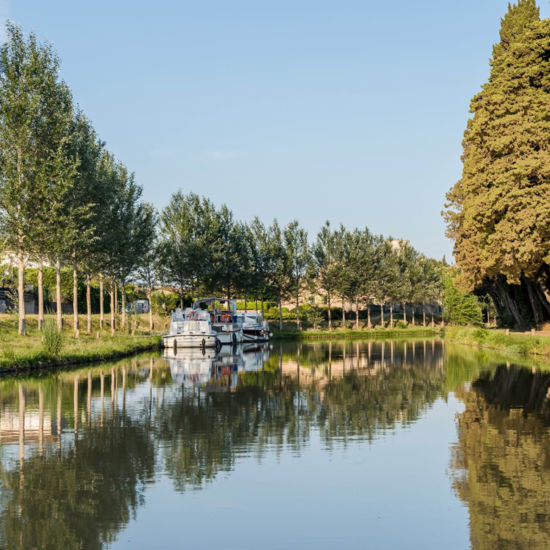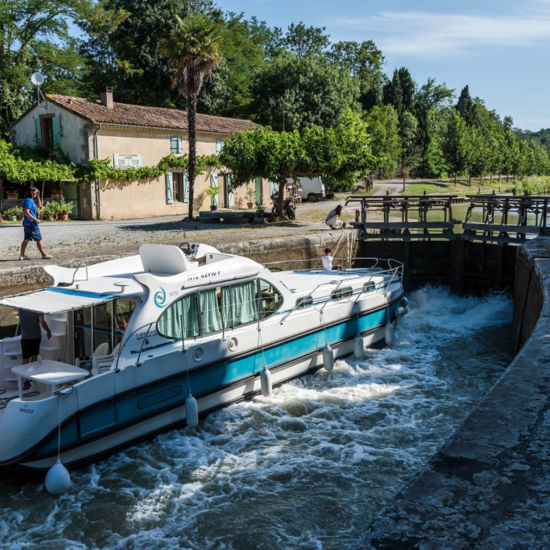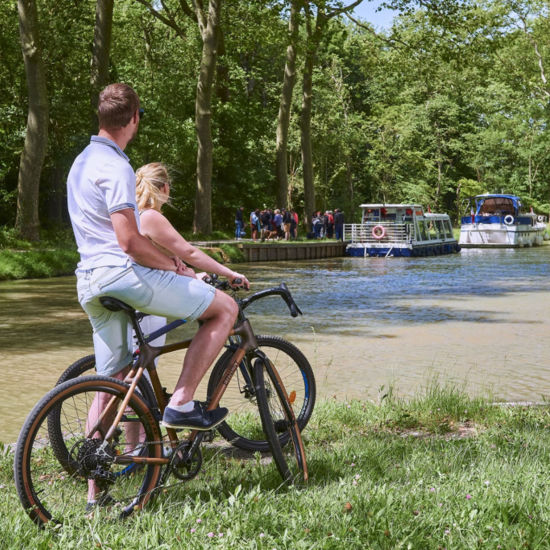
Frequently Asked Questions
Do you have any specific questions about the Canal du Midi? Here is a list of the most frequently asked questions!
The Canal du Midi begins at the Port de l’Embouchure in Toulouse (kilometre marker 0.00) and ends at the Pointe des Onglous in Marseillan (kilometre marker 240.129) where it flows into Thau lagoon. It is therefore 240 km long. To then reach the Mediterranean Sea, you’ll need to cross Thau lagoon to Sète.
The Canal du Midi flows from Toulouse to Thau lagoon in Marseillan.
The Canal du Midi, as a UNESCO World Heritage Site includes:
– the Canal du Midi itself: 240.1 km / 63 locks
– the Canal de Brienne in Toulouse (link between the Canal du Midi and the Garonne): 1.6 km / 1 lock
– the Canal de Jonction and Canal de la Robine (that link the Canal du Midi to Port-La-Nouvelle via Narbonne): 36.5 km / 13 locks
– the water supply channels for the Canal du Midi in the Montagne Noire region: 76 km
– a section of the river Hérault in Agde (0.5 km)
To sail along the Canal du Midi from Toulouse to Thau lagoon in Marseillan, you’ll have to pass through 63 locks: 45 single locks, 12 double, 4 triple, 1 quadruple and even 1 lock with 8 consecutive chambers (shortened to 6 chambers today)! We often speak of a staircase of locks. So you’ll need to pass 63 locks and 91 lock chambers!
If you count the number of locks for the whole UNESCO Canal du Midi site which also includes the Canal de Brienne in Toulouse, the Canal de Jonction and Canal de la Robine, you’ll need to pass another 14!
To sail your own boat on the Canal du Midi, you’ll need a boating permit if the horsepower of the engine is equal to or higher than six. But you won’t need a permit to hire a boat! The rental company is responsible for their own boats and they are authorised to rent them out.
Preferably at the various ports along the route. Outside of these ports, there are zones where you are authorised by the local council to moor overnight if you’re waiting for a lock to open the following morning. In this case, you are also authorised to moor your boat temporarily at the lock waiting pontoon. It is important to avoid mooring your boat in any dangerous places, at locks, on bends or at any engineering structures (bridge, walkway) where visibility is hampered, in short canal pounds or alongside banks that are not adapted.
Please be aware that it is strictly forbidden to tie a boat to a tree, to avoid damaging the trees and allowing the spread of canker stain which is infecting the plane trees.
If you are stopping for the day or overnight, mooring is authorised. However, a boat that remains stationary (private boat, passenger boat, hotel barge, various economic activities) in an area authorised by the local council, must have a temporary occupation permit (COT), issued by Voies Navigables de France, in accordance with article L. 2125-1 of the French General Public Property Code (CGPPP): Any occupation or use of the public domain mentioned in article L. 1 shall incur payment of a fee.
Even though mooring for several days will be tolerated, VNF may request that a COT be issued from day one. Since 2014, there have been systematic inspections.
This fee is to be paid by any owner of a recreational boat that is longer than 5 m or with a 9.9 HP engine or bigger. When you hire a boat, there will be a recreational boating disk on display to certify that the toll fees have been paid.
A toll fee is applied to private and professional navigation on all waterways managed by VNF. This fee is used in its entirety to fund the maintenance and restoration of navigable inland waterways.
Where can I purchase a recreational boating disk?
You can find this information on Notice to Skippers No.1 published annually at the beginning of the season on the VNF website.
VNF guarantees a water height in the canal (boat draft + safety margin of around 20 cm) navigation channel of 1.40 m for the Canal du Midi, 1.60 m for the Canal de Garonne, and 1.30 m for the Canal de la Robine.
Yes, except for the 1st January, 1st May, 11 November and 25 December.
NO, diving and swimming in rivers and canals is forbidden, except for supervised activities in designated areas. To ensure safety and public health, swimming is strictly forbidden along the entire Canal des Deux Mers. Unauthorised swimming may result in a fine.
YES, you are allowed to use a canoe, kayak, rowing racing boat or paddle board on the Canal du Midi and the Canal de Garonne, as long as you respect the navigation regulations.
The canal is a public waterway so you do not need authorisation to use it, as long as you respect the Special regulations for the Canal des Deux Mers. The only issue for canoes, rowing racing boats and paddle boards is that you cannot pass through a lock with them, they will need to be carried from one side of the lock to the other.
You do not have priority over other boats. When passing boats, you will need to stop near the banks.
Please note that Malpas tunnel on the Canal du Midi is narrow and not equipped with lighting, so any non-motorised craft (including canoes, rowing racing boats and paddle boards) cannot be used in the tunnel.
NO, for specific water-based activities and motorised water sports such as water skiing and jet skiing, you will need to contact local authorities or go online to consult the specific navigation regulation for authorised zones in the local area.
YES. The towpaths are suitable for cycling along almost the entire Canal du Midi route.
NO. Horses are not allowed on these paths because the impacts from their hooves, when combined with the tunnels dug out by coypu, make the banks too fragile.
Yes. However, you should not go fishing less than 50 m from a lock, or hamper navigation in any way.
You will need a fishing permit. There are often inspections along the banks.
This practice:
– is forbidden, unless you have been given prior authorisation from the French State: “Often presented as volunteer work to remove pollution from the waterway, this practice is in fact illegal unless you have prior authorisation from the French State (prefecture in accordance with water policy and if necessary, from the regional prefecture in accordance with heritage legislation).”
– is not recommended at all: “Besides the risks to wildlife and to the people involved in the event of unearthing dangerous objects such as ammunition or other explosive objects, magnet fishing could also damage or even destroy archeological heritage, which is punishable by criminal law.”
Magnet fishing is forbidden by decree in the department of Aude.
Do you have any more specific questions?
Don't hesitate to browse the website or use the search function.













